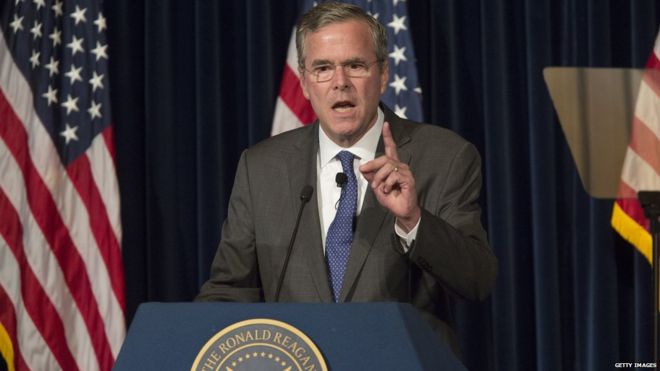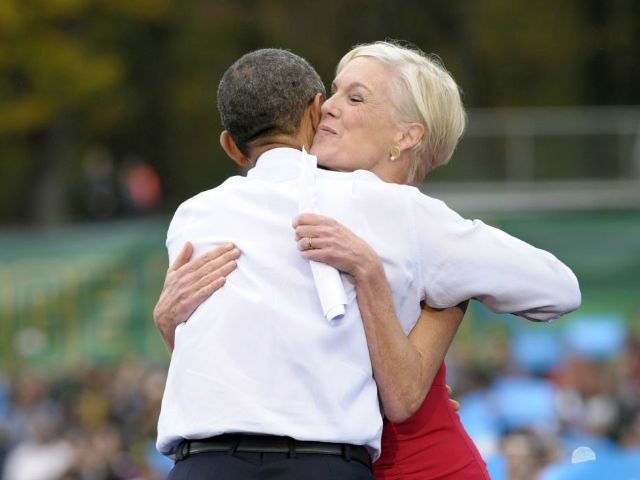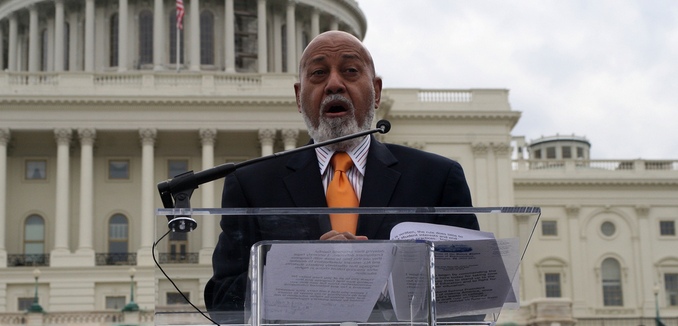
In a 40-minute speech on Tuesday night at the Reagan Presidential Library in California - hallowed ground for conservatives - Mr Bush outlined an argument made by many of the current Republican candidates. By executing a "premature withdrawal" of all US forces in Iraq in 2011, he said, the Obama administration and then-Secretary of State Clinton committed a "fatal error", destabilising the nation and setting the stage for the rise of Islamic State militants.
"So eager to be the history-makers, they failed to be the peacemakers," Mr Bush said of Mr Obama and Mrs Clinton. "It was a case of blind haste to get out and to call the tragic consequences somebody else's problem. Rushing away from danger can be every bit as unwise as rushing into danger, and the costs have been grievous."
Rushing into a dangerous war, of course, is the critique often laid at the feet of Mr Bush's brother, President George W Bush, the man who oversaw the invasion of Iraq in 2003.
When your last name is Bush - and not, say, Walker or Rubio - talking about Iraq is always fraught with peril. In May he was ridiculed for struggling to say whether he'd have approved the Iraq invasion "knowing what we know now".
At first, he said he would, then he said he wouldn't engage in "hypotheticals" and finally he announced he wouldn't have authorised the invasion.
Mr Bush never mentioned his brother by name on Tuesday, although he made a few veiled references to his sibling's often tumultuous foreign policy experience.
"No leader or policymaker involved will claim to have gotten everything right in the region, Iraq especially," he said.
He went on to argue that the US military should become more involved in the Middle East - although the extent of such involvement was left unclear. He called for a no-fly and "safe" zones over Syria, the removal of Syrian president Bashar al-Assad, increasing support for Iraqi Kurds and greater co-ordination between US and Iraqi troops.

After Mr Bush's speech, Clinton campaign advisor Jake Sullivan called the former governor's argument "a pretty bold attempt to rewrite history and reassign responsibility". The 2008 Iraq withdrawal agreement, he noted, was reached while President Bush was in office.
He also contended that the rise of IS is the result of Bush administration missteps, such as disbanding the Iraqi army in 2003 and alienating Sunni factions.
Mr Bush's speech is the latest escalation of a war of words between his campaign and that of his potential Democratic rival. Two weeks ago, Mrs Clinton appeared to catch the Bush camp off-guard with a pointed attack on his record as Florida governor during a speech in front of black activists and entrepreneurs at the Urban League conference in Fort Lauderdale, Florida.
Mr Bush didn't directly respond to the attack in his speech later that day - and was criticised by some on the right for being too timid in the face of a Democratic assault. His campaign appears to be taking steps to change that perception.
Earlier this week, Mr Bush and Mrs Clinton engaged in a round of accusations and counter attacks over education policy via Twitter.
Mr Bush said US student debt has increased 100% over the last seven years of the Obama administration. Mrs Clinton countered by citing a grade of "F" Mr Bush received in 2006 as governor for "college affordability" from the Center for Public Policy and Higher Education.
Both sides likely welcome the opportunity to take shots across the partisan divide, since they could help primary voters who have been reluctant so far to rally behind the supposed front-runners to better envision the candidates as their party's standard-bearers.
The form of best defence, as they say, is attack.











